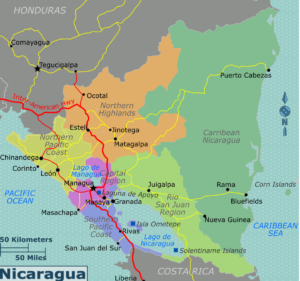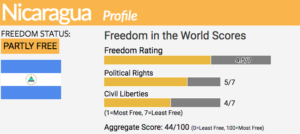The escalating violence in Nicaragua has prompted a bipartisan group of U.S. lawmakers to propose that the Global Magnitsky Law be applied to President Daniel Ortega and some of his leading associates. At least 170 have been killed in a government crackdown against protesters.
“We’re watching this with laser focus because we need to ensure that, the people have called for dialogue, the government participates; the people have called for investigations, the government does that; the military has said we’re staying out of that, they continue to do so,” a senior administration official told McClatchy.

Campaign of terror
To suppress the civic rebellion the government is turning to paramilitary groups which receive orders “from the highest level,” according to security experts.
It has been two months since Nicaraguans rose up in an enormous wave to demand the end of Mr. Ortega’s leadership, a repudiation of the man who has dominated the country’s political life for nearly 40 years, the New York Times adds:
The early power of those protests, when it seemed as if the sheer rage on the street would topple a hero of the 1979 revolution, has given way to the realization that Mr. Ortega and his vice president and wife, Rosario Murillo, are holding fast. What is emerging instead is a campaign of terror by government-backed paramilitary forces, often accompanied by anti-riot police, that appears to be calculated to cow citizens into resignation.
The Organization of American States said in a statement that it “appreciated” the resignation of Roberto Rivas, Nicaragua’s longtime elections chief. Rivas, who had been widely criticized for helping Ortega hold on to power. Last year, the United States placed sanctions on Rivas for corruption under the Magnitsky Act, which blocked him from accessing the U.S. financial system, the Post adds.
In two bipartisan efforts to address Nicaragua’s human rights violations, U.S. lawmakers urged the Trump administration to use the Global Magnitsky Human Rights Accountability Act, which was signed into law in 2016, to hold individuals accountable for human rights abuses and corruption.
“We must not allow human rights abusers and corrupt officials to continue violating their rights without consequence,” the lawmakers wrote in their letter to President Donald Trump, singling out Francisco Lopez, vice-president of ALBANISA, the Nicaraguan subsidiary of Venezuelan oil firm PVDSA, and Francisco Diaz, deputy commissioner of the National Police.
Signatories to the letter include U.S. Sens. Marco Rubio (R-FL), Bill Nelson (D-FL), and Ted Cruz (R-TX), as well as U.S. Reps. Ileana Ros-Lehtinen (R-FL), chair emeritus of the U.S. House Foreign Affairs Committee, and the panel’s Ranking Member Eliot Engel (D-NY).
 The members of Congress want the administration to investigate Diaz “to determine whether he is eligible to be sanctioned under the Global Magnitsky Act for abusing the fundamental human rights of the Nicaraguan people and for his role in the killings of dozens of peaceful protestors.” The letter refers to a May 9 incident when 30 armed National Police officers attacked residents in Managua and threatened media reporters.
The members of Congress want the administration to investigate Diaz “to determine whether he is eligible to be sanctioned under the Global Magnitsky Act for abusing the fundamental human rights of the Nicaraguan people and for his role in the killings of dozens of peaceful protestors.” The letter refers to a May 9 incident when 30 armed National Police officers attacked residents in Managua and threatened media reporters.
Ortega’s attempts in April to unilaterally impose social security reforms sparked widespread protests, the lawmakers wrote. “In response, Ortega unleashed the government’s National Police on these protestors.”

Sergei Magnitsky
In a June 8 letter sent to Luis Almagro Lemes, Secretary General of the Organization of American States (OAS), Ros-Lehtinen joined with U.S. Reps. Carlos Curbelo (R-FL), Mario Diaz-Balart (R-FL) and Albio Sires (D-NJ) calling on the OAS to “publicly and openly work within the OAS to help restore democratic order in Nicaragua.”
They asked Almagro to consider invoking Article 19 of the Inter-American Democratic Charter, which would denounce the regime’s “repression and blatant power grabs” as “an unconstitutional interpretation of the democratic order or an unconstitutional alteration of the constitutional regime that seriously impairs the democratic order.”







